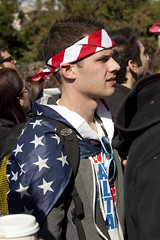 Sociologist R. Tyson Smith recently published an op-ed in the Philadelphia Inquirer about what he calls a growing gap between military veterans and civilians.
Sociologist R. Tyson Smith recently published an op-ed in the Philadelphia Inquirer about what he calls a growing gap between military veterans and civilians.
Following the retirement of Justice John Paul Stevens, the U.S. Supreme Court began its first term since at least World War II without a veteran on the bench. Meanwhile, in Connecticut, Senate candidate Richard Blumenthal was caught fabricating military experience in Vietnam.
These stories reflect a paradox: American civilians continue to love what veterans represent – duty, sacrifice, strength, leadership – but we have less and less true understanding of the veteran experience. Although the United States is in the 10th year of a war, veterans have become increasingly marginalized, accounting for a dwindling share of middle-class and public life.
Smith calls this the “quiet disappearance” of veterans from prominent positions in public life.
So, what’s causing this change? Smith points to the ongoing downsizing of the U.S. military and the lack of the draft.
During World War II, 16 million troops were mobilized at a time when the U.S. population was roughly 140 million. In the Vietnam era, about 3.5 million were deployed (and more than 6 million served) when the population was nearly 200 million. Today, fewer than 2 million service members have been deployed to Iraq and Afghanistan from a population of more than 310 million.
So, since World War II, the proportion of the populace deployed to a recent war has dropped from about 11 percent to less than 1 percent. No wonder veterans refer to themselves as “the less than 1 percent.”
Citing evidence from political science, Smith also notes that socioeconomic status plays a role.
In their book The Casualty Gap, political scientists Douglas Kriner and Francis Shen show that since the Korean War, poorer communities have suffered a disproportionate share of the nation’s wartime casualties. Given this trend, it’s hardly surprising that the number of members of Congress with children serving in combat is in the single digits.
This gap matters for two reasons, according to Smith.
First, veterans and the consequences of war are much easier to ignore when those fighting come from marginalized communities. Many Americans are insulated from the people we expect to die on our behalf.
Second, veterans’ successful readjustment to civilian life depends on social support. Such support usually begins with sharing the war experience and interacting with sympathetic civilians. This is harder to do as vets become more alienated and isolated.

Comments 2
Daily Links for November 7th through November 8th | Akkam's Razor — November 8, 2010
[...] A Patriotic Paradox – [...]
Jim White — December 6, 2010
Thank you for updating the aspects delivered in this analysis. As I reflect, as I am a veteran advocate well placedin the homelessness distressed fields. The centric must become greater in the concentric if in fact the warrior "ethos" transitions with the mind and body.
Veterans are for the most part "engagement" experts. Today for ten years persistant conflict has run the hyper-states. so how to de-compress becomes the focus with veterans 2 veterans prime 3 to community for after-care successes without "entanglement" protocols.